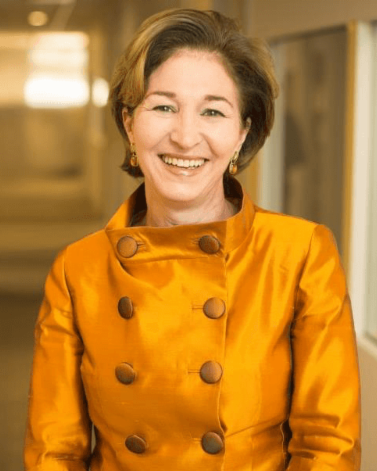Anne-Marie Slaughter on ‘standing up for care’

 In 2012, Anne-Marie Slaughter, former U.S. State Department top official and current president and CEO of think tank New America, penned an essay for The Atlantic that took an in-depth and controversial look into the extreme work-life balance of today’s professional women. “Why Women Still Can’t Have It All” quickly became the most-read article in The Atlantic’s 100-year history.
In 2012, Anne-Marie Slaughter, former U.S. State Department top official and current president and CEO of think tank New America, penned an essay for The Atlantic that took an in-depth and controversial look into the extreme work-life balance of today’s professional women. “Why Women Still Can’t Have It All” quickly became the most-read article in The Atlantic’s 100-year history.
In the essay, Slaughter asserted that the women who have managed to be both mothers and top professionals were either “superhuman, rich or self-employed.” Four years later, however, Slaughter says her perspective has changed.
“I gradually realized that if men and women are truly equal, then traditional “women’s work” — care — must be equal to traditional men’s work — breadwinning through competition,” Slaughter said.
Slaughter is one of several speakers slated to present at Iowa Women Lead Change’s annual Central Iowa Conference, scheduled Oct. 27 at the Iowa Events Center in Des Moines. Slaughter took time last week to answer a few questions via email for Lift IOWA readers.
The title of your presentation at Iowa Women Lead Change’s Central Iowa Conference is “Unfinished Business: Right the Balance — Women, Men, Work, Family,” which is reflective of your recent book by a similar name. What’s your elevator speech on your book’s main thesis?
The unfinished business of the women’s movement is valuing care as much as we value competition, expecting men to be caregivers as much as we expect women to be breadwinners, and adopting a set of policies in our workplaces and through our government that recognize and support the vital work of caregiving.
Has your perspective changed on how women achieve gender equality at work and home since you penned your infamous 2012 essay, “Why Women Still Can’t Have It All”? What factors played a role in that perspective change?
My perspective has definitely changed. First of all, men wrote to me to say that they were living out prescribed gender roles just as much as women used to; that they had no choice about being the family breadwinner and provider, even if they in fact wanted to spend much more time with their families. Gay men and single fathers, or fathers who were the lead parents in their families, also wrote in. I also came to see in my own family that my mother’s work of raising my brothers and me and weaving a strong family foundation for all of us was just as important to society and indeed to me as my father’s work as a lawyer. And I gradually realized that if men and women are truly equal, then traditional “women’s work” — care — must be equal to traditional men’s work — breadwinning through competition.
Some have called this “the problem with no name.” Sometimes the very act of naming the problem fuels more discussion around it (i.e. “Lean In”). What name would you like to see your thesis on the need for public policy and workplace change take on?
Stand up for care.
In this book, you say men need a movement of their own to give them the same range of choices as they pursue work-life balance. As you travel the country, are you seeing any beginnings of that movement? Is your book striking a chord with men, and are you seeing evidence of this through feedback and engagement?
When I speak to younger audiences I get a growing percentage — from 30 to 40 percent of men. Young men and women are thinking much more about how to fit their work and families together as a joint issue, one that will require both members of a couple to make trade-offs. Same-sex male couples also make it impossible to stereotype the man as the breadwinner and the woman as the caregiver. And men respond to me positively on Twitter; see also Josh Lev’s book “All In” on the importance of paternity leave and the competition among Silicon Valley companies to give long and equal parental leave to women and men.
Your husband’s 2015 article in The Atlantic on being “The One” mentioned the “dirty little secret” that female CEOs don’t publicly acknowledge — the need for what male CEOs have always had: a spouse who bears most of the burden at home and is the “lead parent.” Do you and your husband speak jointly on this subject? If so, how often? How important are these conversations, and why do you feel that way?
My husband and I have spoken jointly on the subject. They are absolutely critical conversations, because otherwise we are deceiving young women who want to make it to the top but assume they can do that with a husband who has an equally high-powered career. Again, it’s a matter of equality. I cannot point to a single male CEO of a large company or president of a university or other leader of a large organization who is also a lead parent — meaning he takes responsibility for organizing his children’s lives and is the primary parent at teacher’s conferences, sports games, music lessons, etc. Why should we expect women to do what we don’t expect men to do? The answer has to be that women in these roles depend on their spouses the same way men do.
In line with the last question, single-parent households are on the rise, and 80 percent of those households are led by are single mothers. How does this influence the conversation, as well as public policy/workplace policy needs?
It is important to distinguish between single parents of means and poor single parents. But overall, we not only have too few women at the top, but far too many women at the bottom. The poorest members of our society are single mothers, in part because we expect them to be breadwinners and yet do nothing to support their caregiving. Policies like paid family leave, heavily subsidized or even free daycare, and more flexible work schedules would make a huge difference to these mothers and would pay off in a societal investment in the well being of and opportunity for their children.
When you described the choice between your children and your job, you said this phrase hit the mark on how you felt: “There’s really no choice.” In that 2012 piece in The Atlantic, you went on to refer to something other than social expectations, “a maternal imperative felt so deeply that the ‘choice’ is reflexive.” Do you feel biology plays a role in how mothers vs. fathers feel about this choice?
When I wrote my Atlantic article I did; I no longer do. Based on biological and sociological studies, I believe that although men and women are different in many ways, they care equally about their children. Men who are responsible for childcare from infancy on, to the same extent or more than their wives or husbands, will feel the same tug that women do. It is a matter of social expectation and their own engagement in their children’s lives and awareness that their children are counting on them.
Much talk and speculation surrounds the reasons why men have a harder time playing a more active role as a caregiver (i.e. they fear backlash at work, scrutiny from their peers, etc.). That said, although European countries legislatively addressed many of these areas, they still found they had to further incentivize fathers to take paternity time. Do you see public and corporate policy changes as the change agents to drive societal acceptance, or the opposite?
We need policy change and culture change at the same time, as we have had with norms around smoking or same-sex love and marriage. Policies providing use it or lose it paternity leave are helping to change the culture in the countries that have adopted them, but we need to get all the way to seeing a man who is as competent at home as he is in the office as cool, sexy and masculine.
Here in Iowa, three of four custody decisions are awarded to the mother. Should women join with fathers’ rights groups to mobilize greater collaboration on the goal of true gender equity? As you travel and speak on this subject, have you seen any examples of innovative ways to broaden this discussion?
Women do have to accept that gender equality must cut equally in both directions. If we want society to assume that we are just as competent as men in the workplace, then we have to accept and push to get society to accept that men are equally competent at home. They may do things differently in raising children or housekeeping, but that does not make it wrong, any more than women who do things differently in the office are wrong.
Your final chapter in “Unfinished Business” includes a wish list of public policy changes that would help working mothers and fathers handle responsibilities at home without jeopardizing their careers: high-quality, affordable/subsidized child care, a higher minimum wage, workplace regulations, portable benefits packages, etc. Given your own experience in working in government and given what we’re witnessing in the current political situation, are you optimistic these changes are imminently feasible?
Speaking of politics, and with the timing of our interview, I can’t resist slipping in a question on Hillary Clinton. Given the time you worked with her in the State Department and your assertion in your initial 2012 Atlantic article that the best hope for improving the lot of all women is to close the leadership gap and elect a woman president (and 50 senators!), how critical is next month’s election to this specific issue? Do you think electing the first female president will move the needle in this area in those first four years?










